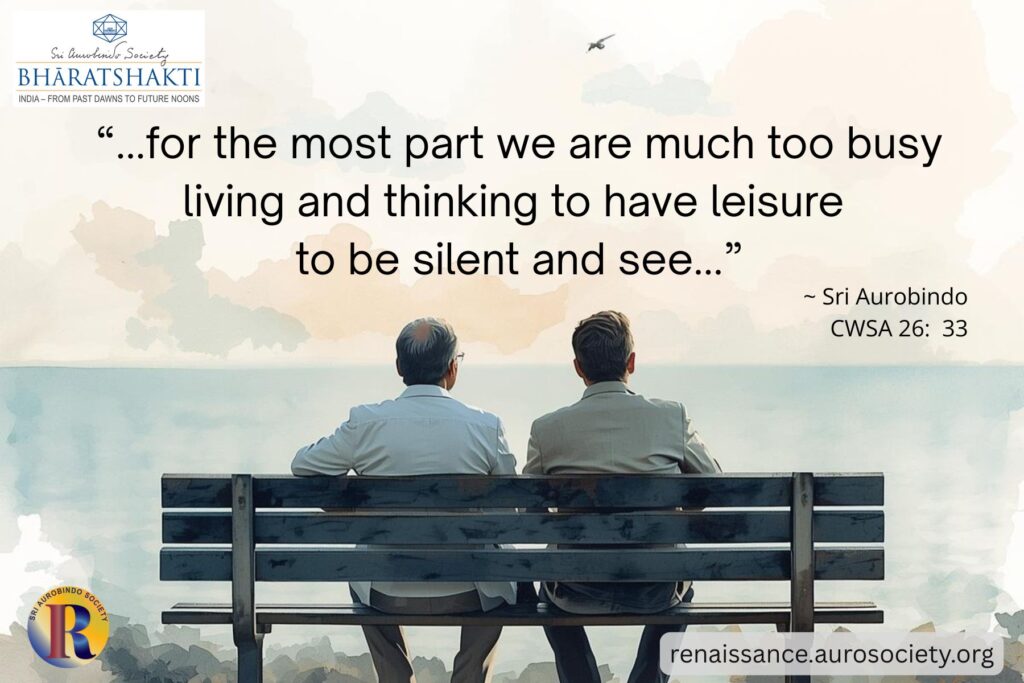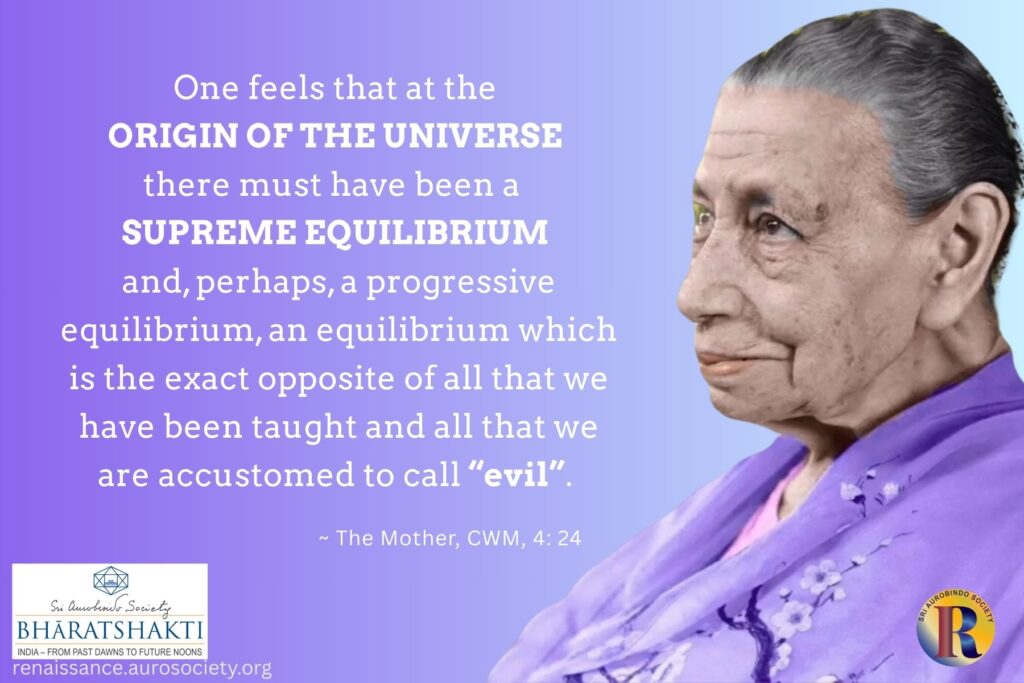Editor’s Note: The first half of this article includes a few passages in which Sri Aurobindo advises us to not suppress sleep but to transform it. He also shares that the sleep can be transformed only gradually and not at once. The second half includes selected words of Mother where she explains the step-by-step practice to silence the body, vital and mind and enter into higher consciousness during sleep.
🌸🌸🌸
Do not suppress sleep but transform it into conscious sleep
At night when one sinks into the subconscient after being in a good state of consciousness, we find that state gone and we have to labour to get it back again. On the other hand, if the sleep is of the better kind, one may wake up in a good condition. Of course, it is better to be conscious in sleep, if one can.
***
It is better to go to sleep and make it a discipline to become conscious in your sleep. Sleep may be only a habit, but it is a necessary habit at present and the thing to do is not to suppress, but to transform it into a conscious inner state.
***
You must not try to avoid sleep at night—if you persist in doing that, the bad results may not appear immediately, but the body will get strained and there will be a breakdown which may destroy what you have gained in your sadhana.
If you want to remain conscious at night, train yourself to make your sleep conscious—not to eliminate sleep altogether, but to transform it.
***
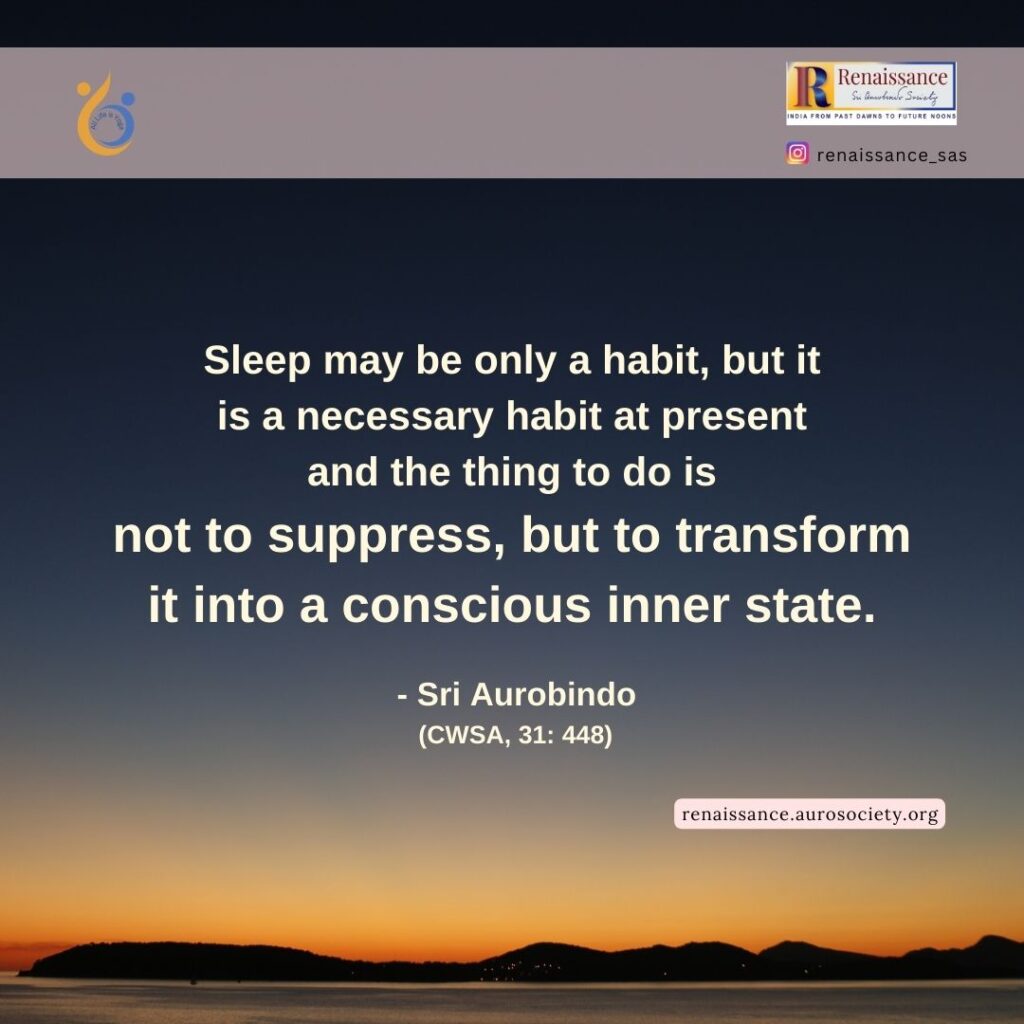
Sleep cannot be replaced, but it can be changed; for you can become conscious in sleep. If you are thus conscious, then the night can be utilised for a higher working—provided the body gets its due rest; for the object of sleep is the body’s rest and the renewal of the vital-physical force.
It is a mistake to deny to the body food and sleep, as some from an ascetic idea or impulse want to do—that only wears out the physical support and, although either the Yogic or the vital energy can long keep at work an overstrained or declining physical system, a time comes when this drawing is no longer so easy nor perhaps possible.
The body should be given what it needs for its own efficient working. Moderate but sufficient food (without greed or desire), sufficient sleep, but not of the heavy tamasic kind, this should be the rule.
***
To keep yourself awake is not permissible—it depresses the body in the end and excites the brain and leads to an unquiet and unbalanced consciousness. The body needs sufficient rest in order to be able to bear the pressure of sadhana.
You can pray or will before sleeping to be conscious in sleep, and you can get your waking mind full of the Mother. That is the best way. But you must not expect to be able to succeed all at once. First, the sleep-mind must become conscious of what it is doing in sleep; only afterwards can you determine what it is to do there.
***
In the sleep what holds the body is the subconscient—and the subconscient acts according to the already formed present habits or else the impressions left by past thoughts, feelings, memories, activities. If the thought of the Mother and her force and working are fixed in the conscious hours, then it will be easier to bring it into the subconscient.
***
Progress will be gradual
As for asserting one’s will in sleep it is simply a matter of accustoming the subconscient to obey the will laid upon it by the waking mind before sleeping.
It very often happens for instance that if you fix upon the subconscient your will to wake up at a particular hour in the morning, the subconscient will obey and you wake up automatically at that hour. This can be extended to other matters.
Many have found that by putting a will against sexual dreams or emission on the subconscient before sleeping, there comes after a time (it does not always succeed at the beginning) an automatic action causing one to awaken before the dream concludes or before it begins or in some way preventing the thing forbidden from happening. Also one can develop a more conscious sleep in which there is a sort of inner consciousness which can intervene.
***
This [unconsciousness in sleep] is quite usual. Consciousness in sleep can only be gradually established with the growth of the true consciousness in the waking state.
***
You cannot expect to be conscious at once in sleep: it takes a long time. If you can be always conscious in waking, then it will be easier to be conscious in sleep.
***
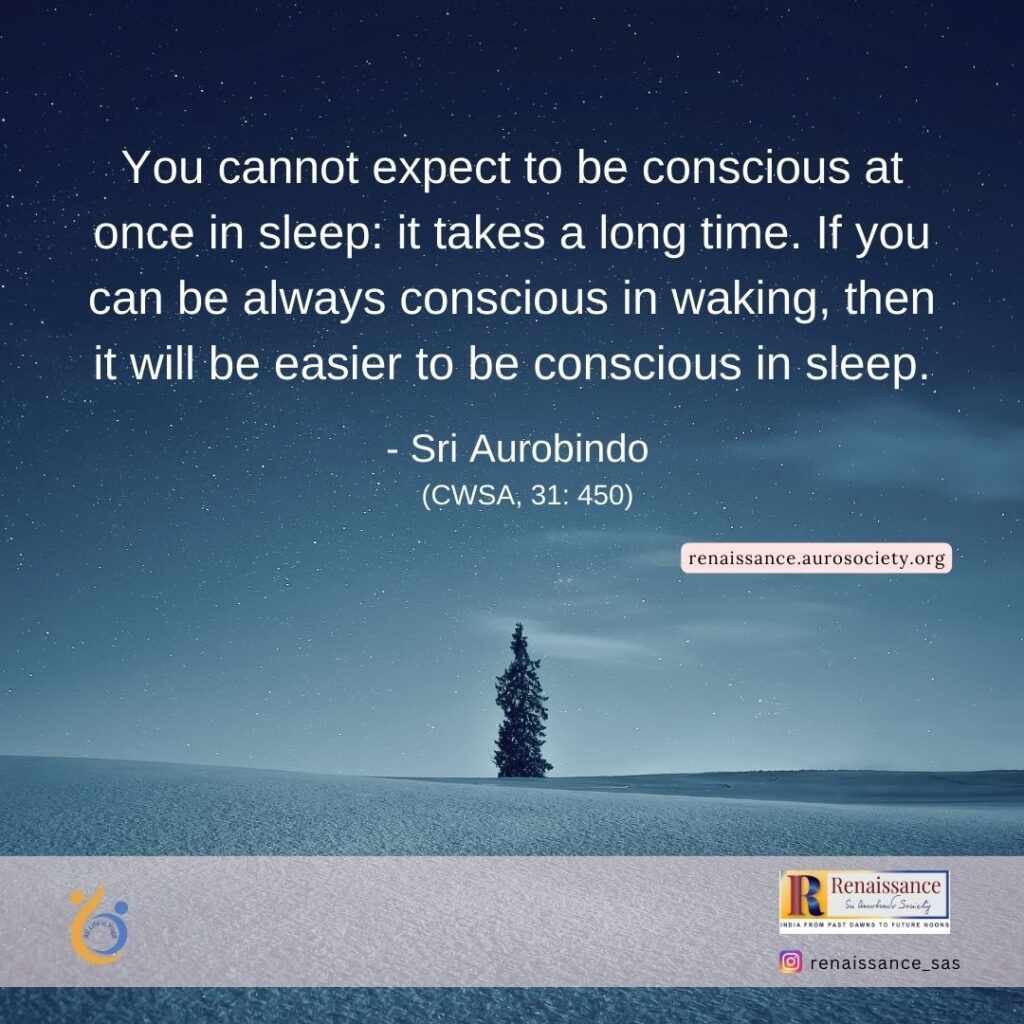
The sleep consciousness can be effectively dealt with only when the waking mind has made a certain amount of progress.
***
All dream or sleep consciousness cannot be converted at once into conscious sadhana. That has to be done progressively. But your power of conscious samadhi must increase before this can be done.
***
That is all right [if the activity of sadhana goes on at night]. It shows that the sadhana is becoming continuous and that you are becoming conscious and using a conscious will in sleep as well as in waking. This is a very important step forward in the sadhana.
– Sri Aurobindo (CWSA, Vol. 31, pp. 448-450)
🌸
Read:
The Need for Sleep and Rest
How to reach the higher consciousness during sleep
As for these stages of sleep which are spoken about here, if one is conscious of one’s nights, one can cover them in a few minutes. One does not need to wait for hours of sleep to do this, you understand; if one is conscious, one can pass through all that in a few minutes.
To begin with, when one is conscious of one’s nights, the first thing to do before falling fast asleep, just in the state when one begins to relax, relax all one’s nerves—I have explained this to you already, one relaxes all the nerves and lets oneself go… like this… you know—well, at that moment, one must relax very carefully all mental activity and make that quiet, as quiet as possible, and not go off to sleep until the mind is quite calm.
Then you escape quite a long period of useless excitement which is extremely tiring.
If you can so manage that the mind relaxes and enters into a complete peace first, your sleep will immediately become very peaceful and very refreshing; naturally, your vital must not be in a turmoil, for then, in that case, it will take you into all sorts of places and make you commit all kinds of stupidities, and the result will be that you will wake up even more tired than when you went to sleep.
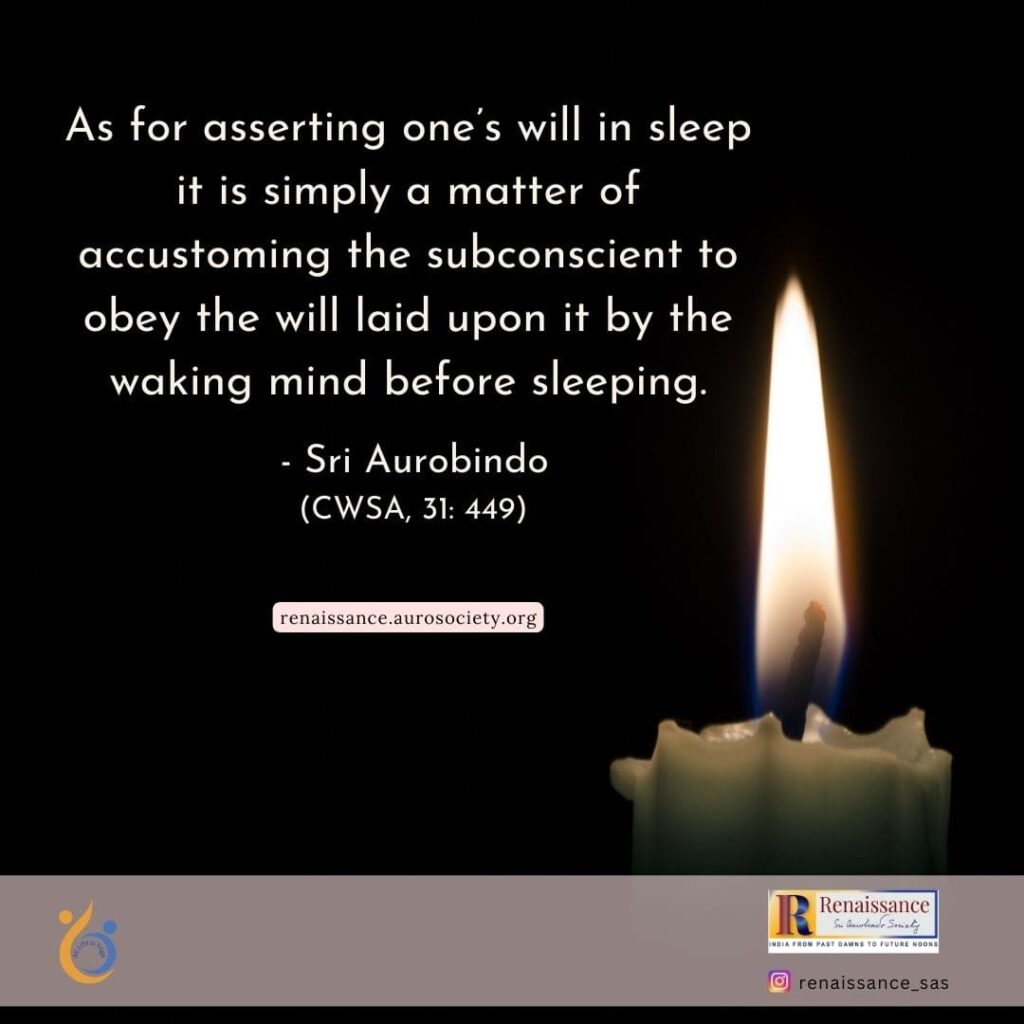
But if you are conscious, after having calmed your vital, when you begin to come out from your physical consciousness and enter a more subtle consciousness, you put your vital to sleep, you say to it, “Rest now, keep very quiet”, and then you enter your mental activity and say to the mind, “Rest now, remain very quiet”, and you put it to sleep also; and then you come out of the mind into a higher region, and there, if it begins to interest you, for instance, if it is the first time you have gone there, you may look at what is happening, have your experience, learn things—at times one learns very interesting things; and then, sometimes one can become aware of a certain general state also, have ideas about other people, other things; it is interesting!
And later, if you have had enough of this, you say, “Keep quiet, sleep, don’t move”, and you put that to sleep, and rise to a still higher consciousness, and so on, till you reach a state where you are on the borders of form, I am not speaking of physical form—on the borders of all form, much higher than the form of thought, naturally; on the borders of all form and all vibration, in the perfect silence, what here we call Sachchidananda.
And when you are there, everything stops, all vibrations subside, and if you remain there just three minutes, you come back to your body absolutely rested, refreshed, fortified, as though you had slept for hours!
This is something one can learn to do.
I don’t say it can be done overnight, a little work is necessary and also some persistence, but still. . . this one must learn to do; and when you are very anxious, very tired, very. . . for instance, when you have just undergone violent attacks from hostile forces in one form or another and are very tired, if you follow this process consciously, well, within a few minutes all that disappears completely. It is something worth learning. Only, one must be very, very, very persevering. . .
– The Mother (CWM, Vol. 6, pp. 185-186)
***
The Yogic repose
Question: Mother, what does this mean: “sleep has to be gradually transformed into the yogic repose”?
The Mother: Ah, yogic repose. It means that instead of an unconscious sleep it is a sleep—if you want to call it sleep—a conscious sleep. The body is in a state of complete repose, with the nerves relaxed, the muscles relaxed; one is completely relaxed and at rest; but the spirit remains conscious, conscious enough to be able to put the vital also at rest, the mind also at rest, and let everything be in a state of peace, quietude, immobility, so that the consciousness may be completely free.
Then the consciousness can either rest also, if it thinks it necessary, or work if it thinks that is needed; and in any case it is free to do as it wants, what it wants, and to go to the regions to which it wants to go. But the parts belonging to the present physical being, that is, the mind, vital and physical, are in a complete repose and a kind of immobility, due to which the hours of sleep do not need to be so long.
One can cut short the number of hours of sleep very much if one leaves the body in this state of rest.
But this asks for much work, and a very conscious work, you see, very conscious and very persistent. It cannot be had immediately, it may require years of discipline.
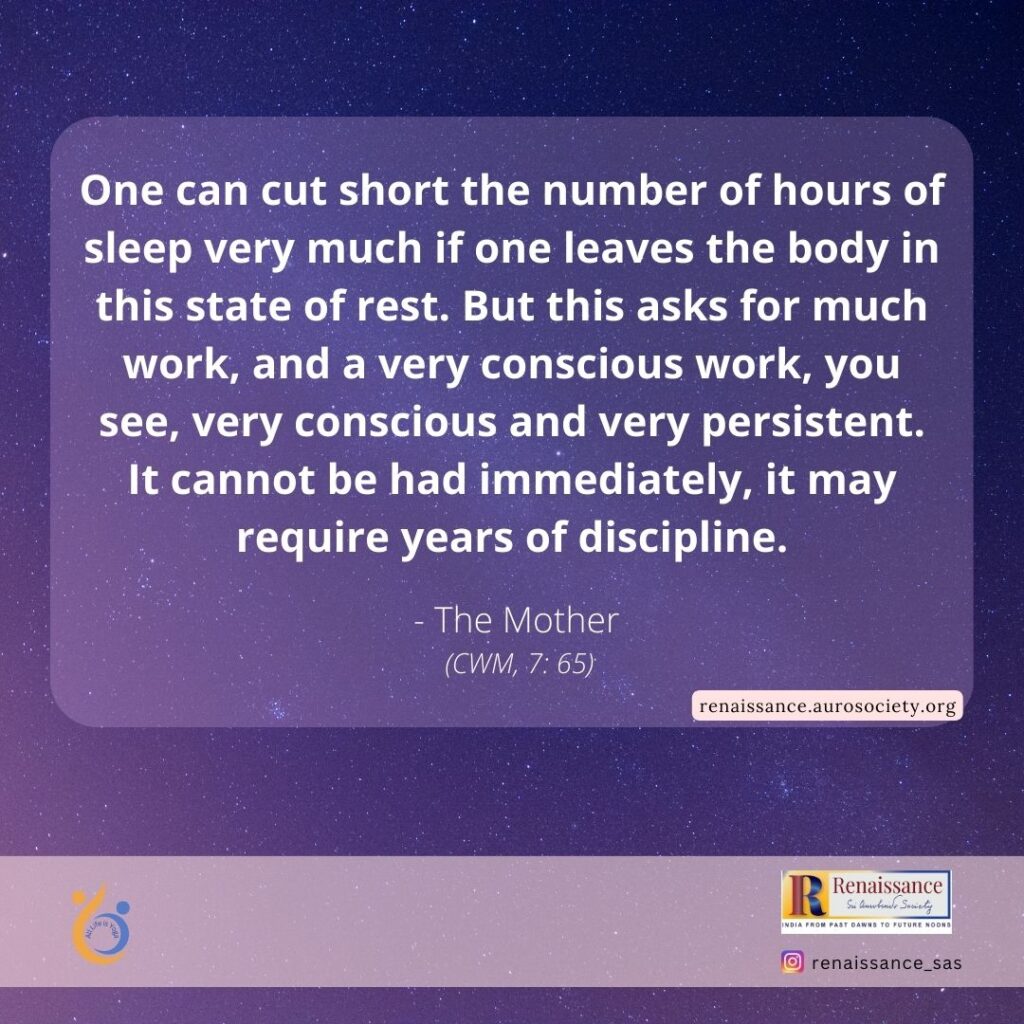
Only, once it is acquired, well, one has mastered sleep and can prevent, well. . . For example, there are many people who, when they go to sleep, are in a very good state of consciousness, and when they wake up in the morning they are completely dazed and have lost all that they had gained the previous day; and that’s because their sleep is unconscious and they go out in the vital or the mind or the subtle physical; they go to undesirable places or else fall into the inconscience and lose in this inconscience all they had gained before…
It is something very necessary, but it can’t be acquired very easily.
It is one of the most difficult things to do, but it is very useful; only, one can hardly do it without a very close guidance, because unless one knows how to do it even to the last detail, one risks doing stupid things.
– The Mother (CWM, Vol. 7, pp. 65-66)
***
The ideal, you see, is to enter an integral repose, that is, immobility in the body, perfect peace in the vital, absolute silence in the mind—and the consciousness goes out of all activity to enter into Sachchidananda.
If you can do this, then when you wake up you get up with the feeling of an extraordinary power, a perfect joy. But it is not very, very easy to do this. It can be done; this is the ideal condition.
– The Mother (CWM, Vol. 7, pp. 123-124)
🌸🌸🌸
Also Read:
Reasons for Attacks in Sleep and the Protection
~ Design: Raamkumar


